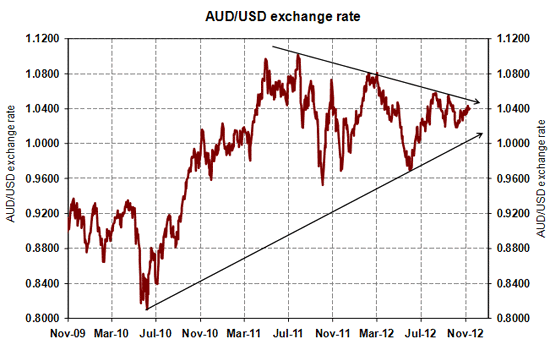
 By Roger J Kerr
By Roger J Kerr
Over recent years it has been very rare for domestic economic data releases to really shift the value of the NZ dollar in the foreign exchange markets, however the September quarter’s employment number was enough of a shocker to send the Kiwi dollar a cent lower against the USD.
While the Kiwi has moved to the bottom end of its now long-established trading range at 0.8150, it will require a weaker AUD against the USD to drive it below the key support levels and take it below the psychological 0.8000 level.
There is no question that the economic outlook for New Zealand is not as positive today as it was earlier in the year when the bumper agricultural production pushed our GDP growth upwards.
The fact that the NZD/USD exchange rate has now been above 0.8000 for long periods this year is clearly eroding into export and manufacturing profits, investment/expansion plans and confidence.
The local jobs numbers, being a survey of households, appear dodgy as other economic data indicates that construction is now picking up quite strongly on the back of Christchurch and a big catch up with house building in Auckland.
Do not be surprised to see a sharp reversal downwards in the unemployment rate when the December quarter figures come out in mid-February.
Weaker domestic economic numbers however, particularly when the September quarter’s GDP outcome is released on 20 December, may weigh the Kiwi dollar exchange rate lower as our attraction as a well performing economy to foreign investors wanes.
Looking ahead, the risk and probability of the NZD/USD pushing above the previous high of recent months 0.8350 and on to 0.8500 appears to have reduced, for a number of very good reasons:
• The AUD made immediate gains to $1.0500 when the RBA delivered another surprise last week and did not cut their interest rates. The Aussie currency could not attract new buyers at the higher levels and is retreating back down again, repeating the pattern of the new highs always being below the previous spike upwards. The RBA will cut interest rates next month if their economic data weakens, however so far to date the Australian economic figures for jobs and retail spending have not fallen away as they were expected to.
• The Euro has reversed out of the gains it made against the USD at the time of the US QE3 monetary loosening in September. Euroland is in economic recession with further interest rate cuts inevitable from the ECB. The EUR/USD rate is now back at $1.2700 after peaking at $1.3200. Further EUR weakness has to be expected in the face of their continuing economic problems and improving US economic data.
• Global equity markets (with a few exceptions) have made impressive gains this year, however as the end of the year looms one would have to expect profit-taking (i.e. selling) on existing portfolio positions rather than fresh aggressive buying of shares. The Dow Jones Index decreased on the re-election of President Obama as it was the same President with the same problems going forward. Further weakness in the Dow is negative for the NZD/USD rate as the “risk-off” mode prevails with investors and traders.
• In addition to equity prices retreating, the volatility of movement in the markets is expected to increase as investors and traders in the USD start to fret about the US$600 billion fiscal cliff as at 1 January 2012. Political brinkmanship is highly likely to prevent sensible solutions to tax changes and spending cuts ahead of 1 January. Markets do not like uncertainty and uncertainty with the fiscal cliff will be immense. Rising market volatility is also negative for the NZD/USD exchange rate.
• While the slowing in the Chinese economy has abated with improving data over recent weeks, it is very instructive that hard commodity prices have not recovered and thus the stockpiles inside China have not reduced to ant great extent.
The above-listed forces all suggest the Kiwi dollar pushing below 0.8000 and potentially lower over coming weeks. It is difficult to see what the positives would be for the currency from both overseas drivers and local economic events.
The pressure is starting to mount on new RBNZ Governor Graeme Wheeler to cut interest rates, particularly after the weak employment figures.
However, he appears very much to be his own man (and monetary policy purist) and thus will not cut interest rates when house price increases in the economy may already be lifting future inflation.
A sharply weaker currency pushing up tradable goods prices, on top of rising non-tradable prices due to a housing min-boom, would reverse the current low inflation rate and cause the RBNZ a problem in 12 months time. Graeme Wheeler’s monetary policy management would not want to be the cause such volatility in the economy.
Over coming months the major determinant of NZD/USD direction will be whether the AUD breaks higher or lower against the USD.
The chart below suggests that something is about to give with respect to the Aussie dollar.
If $1.0100 is breached with the AUD going south, further selling is likely as global investors reduce AUD holdings.
------------------------------------------------------------------------------------------------------------------------------
To subscribe to our daily Currency Rate Sheet email, enter your email address here.
------------------------------------------------------------------------------------------------------------------------------

------------------------------------------------------------------------------------------------------------------------------
* Roger J Kerr is a partner at PwC. He specialises in fixed interest securities and is a commentator on economics and markets. More commentary and useful information on fixed interest investing can be found at rogeradvice.com
No chart with that title exists.
1 Comments
I believe the Kiwi and Aussie will be weaker in 12 months time due to a more pronouced slow down in China (weaker industrial commodities). Agriculture commodities on the otherhand will hold key support so they may have a nominal correction but nothing like the industrial commodities some of which I believe have already peaked and will be some years before they recover. This will hit the Aussie and the Kiwi will most likely follow . There is also a lot of issue that need resolving or starting in 2013 so this will mean commodity currencies will have a correction.

We welcome your comments below. If you are not already registered, please register to comment
Remember we welcome robust, respectful and insightful debate. We don't welcome abusive or defamatory comments and will de-register those repeatedly making such comments. Our current comment policy is here.